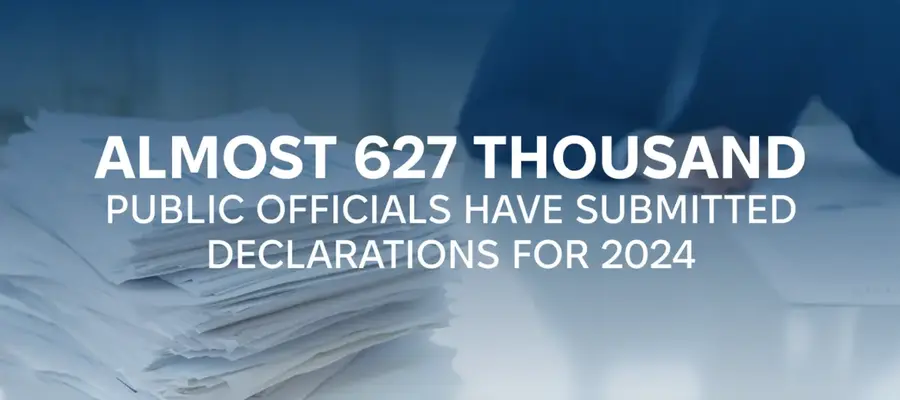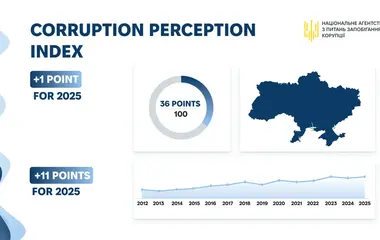Almost 627,000 declarations for 2024 were submitted by public officials during the declaration campaign that ended on 31 March 2025.
In 2024, when three declaration campaigns were running simultaneously, more than 664 thousand declarations were filed for the reporting period of 2023, 649 thousand for 2022, and 656 thousand for 2021.
The declarations for 2024 were submitted by 137 top ministry officials, over 47.6 thousand officials of categories ‘A’ and ‘B’ (civil servants holding senior positions), over 5.1 thousand judges, over 19.6 thousand prosecutors, investigators and coroners, and over 109.4 thousand local government officials.
The largest number of declarants came from the city of Kyiv and the northern regions (178,000), as well as from the western regions (170,000). Central regions submitted 147 thousand declarations, southern regions - 82.5 thousand, and eastern regions - 47.4 thousand.
The dynamics of declaration submission increased towards the end of the campaign. Thus, in January, almost 20 thousand declarations were filed, in February - over 124.7 thousand, and in March - over 482 thousand.
During the last two weeks of March, the average number of declarations filed on working days was over 22,000 per day, compared to about 13,000 in early March. On weekends, the filing of declarations traditionally slowed down to an average of about 9,000 declarations per day.
On 31 March, the last day of the declaration campaign, public officials filed almost 20,000 declarations, while the largest number of declarations - more than 24,000 - were submitted on 19 March.
Over the course of the three-month declaration campaign, the NACP's contact centre specialists provided more than 30,000 consultations, including more than 21,300 by phone.
The uniqueness of this declaration campaign was not only the improved declaration form, which is facilitated by the ability to select data from reference books, updated drop-down lists and tips, logical checks, links to clarifications, but also the opportunity for declarants to use the function of partial auto-completion of the draft declaration, which the NACP presented in October 2024. In order to use this function, in particular, it is necessary to form a certificate ‘Data for the declaration’, which allows you to collect data on your and your family members' assets and income, and other information from 16 registers and databases. In 2024, more than 260,000 declarants did so. Since the launch of the Data for Declaration function, it has been used more than 820,000 times, including for the years 2021-2024.
"Using the function of partial auto-completion of the declaration, declarants were able to avoid mistakes and misprints by using data from the registers that the state already knows about them. Reducing technical errors in declarations will help the NACP to select the most risky declarations for full verification. In this way, we will increase the effectiveness of inspections by focusing on identifying signs of illicit enrichment of officials, unjustified acquisition of assets, and detection of assets hidden from declaration, including those abroad. The NACP plans to start reviewing 2024 declarations in May this year, as declarants have 30 days to correct their declarations from the date of submission. After that, all declarations will undergo a risk assessment using logical and arithmetic controls. Currently, we are checking the declarations submitted for previous periods,' said Viktor Pavlushchyk.
We remind you that if you find errors in your declaration, you can correct them once within 30 days from the date of filing.
During the declaration campaign, the NACP team held 30 training events in various formats - from seminars, thematic training programmes to large-scale webinars - to help MPs, civil servants, judges, local government officials and other stakeholders understand the e-declaration procedures and current innovations.
Among them was the largest seminar ‘Filling in e-declarations: innovations and tools for simplification’, which reached 16,000 public servants during its holding and now has more than 40,000 views.
A new category of declarants, members of expert teams who became declarants after the reform of the Medical and Social Expert Commission, was also taught the basics of declaring.
In addition, anti-corruption commissioners were also trained, as they are the ones who help declarants on the ground to understand integrity issues. 150 commissioners completed a two-day advanced training programme organised jointly with the Higher School of Public Administration, and more than 5,000 commissioners deepened their knowledge during webinars on the practical aspects of organising declaration work in their organisations.
We remind you that certain declarants have the right to postpone filing their declarations during martial law. Declarations filed by such persons may not be displayed in the public part of the Register of Declarations.









